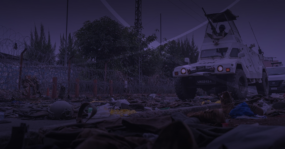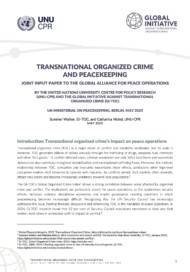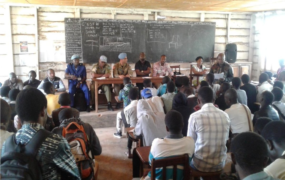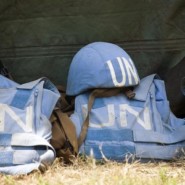Posted on 28 May 2025
Peacekeeping is in crisis. Despite a dramatic rise in violent conflicts in many parts of the world, the United Nations has not deployed a new peace mission since 2014. Several large operations have been closed or scaled down, while others are facing financial cuts. Meanwhile, organized crime remains absent from the agenda, even though it is one of the greatest threats to peace and security in almost every theatre in which peace operations are deployed.
On 13 and 14 May, representatives from over 130 countries gathered at the UN Peacekeeping Ministerial in Berlin to discuss the future of peacekeeping and to pledge political and financial support for peace operations. While VIPs were driven in limousines through cordoned-off streets in the German capital, UN peacekeepers in the Democratic Republic of Congo (DRC) were on high alert against attacks from rebels fighting for control of mineral-rich regions in North Kivu. Meanwhile, the understaffed and outgunned Kenyan police leading the support mission in Haiti hunkered down in Port-au-Prince in the face of growing threats from criminal gangs, which now control most of the country.
The contrast could not be starker. Yet the threat posed by organized crime was barely mentioned at the UN’s high-level political forum. It is also revealing that almost none of the pledges made by the 74 member states were related to organized crime. This lacuna undermines international peace and security, as well as the credibility of the UN.
Less peace, more crime
Recently, long-running peacekeeping operations in Darfur and Mali were terminated, while the decades-old stabilization mission in the DRC is being drawn down. There has been insufficient political will to deploy blue helmets to Haiti, and there are rumblings, not least from the United States, about possible funding cuts for these types of initiatives. Consequently, rather than demonstrating multilateralism in action, the recent track record of the UN and its member states looks more like multilateral inaction.
There is, however, a lot of talk about how peacekeeping should be reformed. This is evident in numerous reports, such as the UN’s New Agenda for Peace, the Pact for the Future and Action for Peacekeeping, which are full of good intentions. But few of these mention organized crime. Indeed, for some time the problem has been treated by the international community as the elephant in the room. A rare exception is the publication titled The Future of Peacekeeping, New Models, and Related Capabilities. Of the 30 models it outlines, number 17 focuses on how to ‘prevent, disrupt, and dismantle organized criminal activities … as threats to international peace and security’. The Global Initiative Against Transnational Organized Crime (GI-TOC), together with the UN University Centre for Policy Research, has also provided recommendations on transnational organized crime and peacekeeping.
Some may argue that peace operations should not be dealing with organized crime. However, this overlooks the undeniable and growing correlation between crime and conflict, which was a key finding of the latest Global Organized Crime Index. As the analysis of the data collected in the Index revealed, ‘the more affected by conflict a country is, the higher the likelihood of it experiencing reduced levels of resilience to organized crime’.
Furthermore, if peace operations do not confront organized crime, who will? Experience has shown that if these problems are left unaddressed, they fester, resulting in criminal governance or violent competition for control of illicit economies. Where national police and armed forces are inadequate or complicit, it is armed groups, private military companies or foreign powers that fill the void. This usually leads to protracted instability and suffering for the affected populations.
New models and approaches
With this in mind, it is worth considering new models for peace operations that could address the impact of illicit economies more effectively. One option, as recommended in the Future of Peacekeeping report, is to deploy counter-organized crime missions for fact-finding about criminal markets and actors, and to provide technical expertise and assistance to national institutions. With sufficiently robust mandates, such missions could also carry out ‘“executive” action’ – such as gathering evidence and making arrests – with the necessary consent from the host state.
If that is a step too far, peace operations or political missions could include a sufficiently trained and equipped component to monitor and provide strategic advice on reducing the threat posed by organized crime. These teams could be staffed by experts with specialized skills, including threat assessment, financial intelligence and criminal justice reform. This would allow new types of peace support actors to be involved, including those from specialized crime-fighting agencies, such as INTERPOL; experts in fighting economic and financial crimes, such as Italy’s Guardia di Finanza; gendarmerie; and civil society actors.
In addition, more granular information is needed about criminal markets and actors, as well as more thorough mapping of political economies in conflict zones. The GI-TOC’s Observatory of Violence and Resilience in Haiti is a good example of this, as it provides a forum for data-driven research aimed at empowering civil society and encouraging long-term stability. Such initiatives could be used to design strategic approaches to disrupting illicit economies in conflict zones.
At a minimum, counter organized-crime teams should enhance force protection. However, one would hope that they would also be used to strengthen national crime-fighting capacity and protect civilians. Despite the UN’s strong focus on protection of civilians, the fact that armed groups and state-embedded actors engaged in illicit activities pose one of the biggest threats to peoples’ security in conflict-affected regions is rarely recognized. This threat does not always manifest as violence; it also takes the form of criminal governance. Such business models are a major impediment to peacebuilding and sustainable development.
Even in the absence of a mandate or willingness to deploy a peace operation, counter organized-crime teams could be dispatched at the request of UN member states or regional organizations on an ad hoc basis. These teams could build on the experience of specialized police teams and draw on lessons learned from UN Panels of Experts that have been used to monitor sanctions and analyze regional conflicts. They could, for example, help map criminal markets and actors, and collect evidence of activities and offences, such as human rights violations. They could also advise on integrating crime prevention or social resilience initiatives into stabilization and peacebuilding processes.
Regardless of such operational responses, troops and police deployed to peace operations must receive training on the potential impact of illicit economies on their work. They should also have the necessary expertise and resources to monitor illicit activities and criminal actors who could endanger their mission. Furthermore, guidelines are urgently needed to ensure that peacemakers engaged in mediation processes are aware of the environment in which they are operating, the motivations of their interlocutors and the potential hazards that could jeopardize peace processes.
With or without peace operations
In a panel discussion at the UN peacekeeping ministerial, Jean-Pierre Lacroix, the Under-Secretary-General for Peace Operations highlighted the increased importance of organized crime as a driver of future conflicts. However, as demonstrated by the high-level meeting in Berlin, organized crime is not on most countries’ radars, and peacemaking, peacebuilding and peacekeeping lack the political support, mandates, resources and personnel required to tackle the growing threat. This needs to change if the UN is to protect its missions and make peace.
At the same time, as peacekeeping operations are being downsized, it is essential to develop strategies for responding to organized crime in conflict zones where such operations are not present. This could involve closer collaboration with regional organizations, specialized crime-fighting agencies, civil society and local communities.
As the crisis in Haiti makes clear, the international community is at a critical juncture. It must change its approach to addressing the impact of illicit economies on peace and security. It is time to acknowledge that the future of peacemaking, peacekeeping and peacebuilding will be shaped by organized crime.



